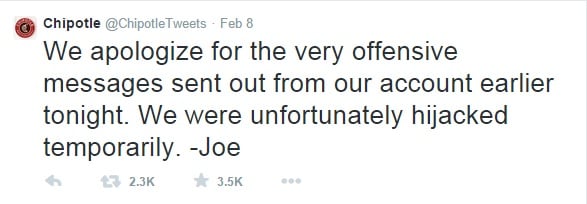Last week Coca-Cola invited people to reply to any negative comments circulating the twitter sphere with the hashtag #MakeItHappy. An automatic algorithm translated the tweets into cute pictures.
Spotting an opportunity for mischief, American blog Gawker made a Twitter bot, @MeinCoke, and tweeted snippets from Mein Kampf with the hashtag.
As a result, Coca-Cola’s twitter published chunks of Hitler’s text in the form of pirate ships, smiling faces, and palm trees.
While no one at Coca-Cola could have predicted that someone would feed it Hitler’s words, Coca-Cola could – and did - realize the risk of something going wrong.
It says it prepared for the automatic algorithm with “rigorous scenario planning, built and tested software, and incredibly extensive filters.”
But can these tools ever be as effective as the human eye?
Nip a crisis in the bud
Some of Hitler’s words tweeted to Coca-Cola may not have immediately raised alarm bells – ‘My father was a civil servant who fulfilled his duties very conscientiously,’ for example. On the other hand, would a human have questioned why such a statement was sent to a #MakeItHappy campaign?
Social media expert Adrian Moss, director of Focus Business Communications, says brands need to be aware of how automation can go wrong, and more importantly, have systems in place to nip a crisis in the bud.
“I’m not sure, in this instance [with Coca-Cola], someone would have been able to pick it up,” he told BeverageDaily.com. “But by its very nature: if it goes wrong or someone makes it go wrong, you are at risk.
“It’s the same with drone delivery systems, or driver-less cars – in theory it’s very interesting, but if it goes wrong heaven knows what will happen.”
Social media compresses time and expands impact
Key points for any brand using social media are to exercise caution, have a system of checks in place, be in a position to react quickly, and respond with maturity, Moss said.
Automated tools can save time and effort, but brands must expect the unexpected.
“Tools are great, but if something goes wrong, have you got the systems in place to fix it and not wait until 9am on Monday?” said Moss. “In social media, you can cause damage in such a short space of time. Whereas in the past a problem would trickle through, social media compresses time and expands impact.
He warns automated postings can have unpredictable and unfortunate consequences – in the case of the Boston Marathon bombings, pre-scheduled tweets backing runners or championing the event were still being sent out after the incident.

‘How the organization reacts and apologizes is as important as the incident itself’
Restaurant chain Chipotle Mexican Grill had its own social media nightmare this week: its account was hijacked and started sending out offensive tweets accompanied by a swastika.
Chipotle apologized, including its apology on twitter, and explained it had been hijacked.
Their reaction follows Moss’ advice of responding to a social media crisis.
“Sometimes the excuses or reasons given by companies can be fairly lame – they say it was a junior person, or an agency – and the company or brand owner doesn’t take responsibility,” he said. “I think sometimes how the organisation reacts and apologizes and explains is as important as the incident itself. Consumers can be concerned about the brand not taking it seriously.
“In any issue, it’s having in place a mechanism so you know who’s authorized to make the comment, own the comment, and be a real person rather than a ‘spokesperson.’ Social media is more human. And it’s got to be quick.
“Years ago people would put big apologies in the paper: the concept is not new, but in social media you apologize humbly and honestly, explain, and move on.”
